The decision to leave Cairo wasn’t one Sanaa Seif made lightly, despite the long stretches in prison, vicious beatings and threats of worse to come from Abdel Fattah al-Sisi’s repressive regime. For the 28-year-old pro-democracy activist, going into exile didn’t only involve saying goodbye to home, friends and family. It meant leaving the country where her brother, Alaa Abd El-Fattah, is jailed and on hunger strike.
“It took a lot of contemplation,” she says, sitting at the kitchen table of her temporary London home and reflecting on her most recent time in prison. “I had time to think – this was my third stretch inside.” During exercise breaks, there was a tree in the courtyard under which she would sit and consider her options. Opposite were the cells where those facing a death sentence were detained. “I had to accept that could be my future,” says Seif. “That’s what the authorities threatened. Maybe I’m naive not to have realised it earlier, but Cairo was never going to be safe again.”
Seif was barely 17 in January 2011, when the Egyptian revolution started. Raised in the north of the capital, she came from a well-known political family: her father, Ahmed Seif, was a respected human rights lawyer, while her British-born mother, Laila Soueif, was an academic and activist at the University of Cairo. “But I was the youngest child,” Seif says. “Nobody spoke about anything serious in front of me. I knew there was inequality, and that my father had issues with the authorities. But I was shielded from the details – a spoiled brat.”
History marks 25 January 2011 as the start of Egypt’s revolution. Of course, nobody knew then. “I’d heard there were protests happening that day,” Seif remembers. “Some of my friends were going. But I had a party that night which I didn’t want to miss.” Short on money for the evening ahead, Seif called her mother, asking for cash. The teen was given short shrift: “I don’t have time for this, there are campus protests, your mother is busy.” So Seif headed to the campus to track her down. At the gates, she was detained by police. “I called my mum, who collected me,” Seif says. “She wasn’t happy: ‘Sanaa, I told you this isn’t a good day.’”
Rising tensions became clear. As they walked through the university, Seif clung to her mother. “My family had been trying to change things in Egypt for decades,” she says. “Something in the air gave people hope, a feeling that this was finally possible.” With a few hours until her party, Seif stuck around.
“The marches grew larger,” she recalls. “Those who made it past police lines arrived at Tahrir Square, where teargas was thrown.” She watched from the sidelines, feeling like an outsider. “When the police started attacking protesters,” she says, “I assumed the crowds would disperse.” Much to her surprise, they refused. “People were beaten by officers then ran back into the protest. I’d never seen anything like it: their determination made me believe this could be huge.”
That evening, Seif remembers, the police temporarily retreated. Rumours spread they would return at midnight to forcibly clear the square. “Still, nobody left,” she says. “Instead, women and children were gathered, men formed human barricades. There was so much bravery and resilience.” Friends were calling: they were heading to the party; where was she? In the end, Seif never went – she couldn’t tear herself away. “From that moment I was in. I was part of the revolution – there was no looking back.”
Despite the 13 years between them, Seif and Alaa were always close. “Alaa wasn’t just an older brother to me,” she says. “He was a father figure. A mentor.” She checks her phone intermittently, anxiously awaiting news from her mother’s visit to Alaa’s prison in Cairo.
In the late 00s, as adolescence hit, Self’s school grades suffered. “I was this disengaged, bohemian teen,” she says. “And there was lots of drama at home.” Married and with his own place, Alaa took in his teenage sister. “He studied with me,” she says. “Supported me, gave me pocket money. It was his responsibility to make sure I passed school.” She stayed there for two years. By 2011, Alaa had relocated to South Africa for work.
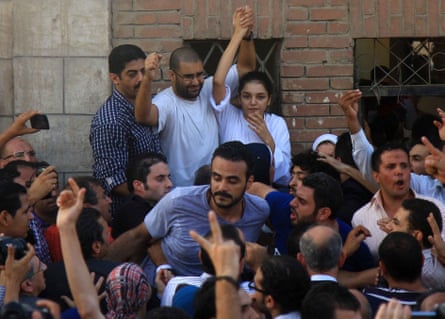
On the frontline in the early days of the Egyptian uprising, Seif knew little of the vital role her brother was already playing in the movement. With the internet in Egypt all but cut off, Alaa – from his home in Pretoria – was sharing news of what was happening with the rest of the world. Since the early 00s, he had been a vocal activist and campaigner; his 2006 involvement in peaceful protests saw him spend 45 days in jail.
Alaa returned to Cairo late on 2 February. Over the following months, the siblings began to see each other differently. “I realised the important role he played to these people,” she says. “Speaking to crowds, communicating and coordinating. And he was surprised, too, that his spoiled younger sister was on the frontlines at Tahrir.” The country too was in a state of transition. President Mubarak was forced to resign on the 18th day of demonstrations. The military dissolved the constitution, temporarily taking power.
By late 2011, the revolution was in full swing. Despite new laws restricting demonstrations, clashes between protesters and the military were common. “We didn’t know it then,” Seif says, “but what we witnessed on the night of 9 October changed the direction of both the country and our family.” That Sunday, a group of Coptic Christians had gathered outside Cairo’s state television offices. “It was over something simple: the demolition of a church,” she says. “And the streets had opened up by then; people from all sections of society were protesting. Then the army drove tanks straight into the peaceful crowd.” This would become known as the Maspero massacre. Twenty-four people died and more than 200 were injured.
“Neither Alaa or I were there at the time,” Seif says. “I rushed there, my brother, too. When I arrived, the tanks had left. Some of the bodies were being carried away; others were surrounded by distraught families.” Seif realised she knew one of the men killed. “I was in a state of shock,” she recalls, unable to comprehend the devastation in front of her. “It shook me to my core, and changed my entire understanding of what the military was willing to do.”
Meanwhile, Egyptian state television was reporting that Christian protesters had in fact attacked the army. That fictitious version was initially picked up by the likes of the BBC and CNN. Seif is clear: “That was bullshit. The military was trying to incite sectarian war, to create instability to tighten their grip on power and not let go. I, Alaa and others there could see.”
As people with sticks gathered to attack the grieving demonstrators, Alaa stepped in. “He organised human shields to surround the bodies and mourning families,” Saif says. “He was one of the most prominent voices – making interventions on TV, writing a newspaper article setting out the truth.” Ultimately, the authorities were forced to row back. “The plot failed,” Seif says. “And that was because of the efforts of people like my brother.”
That month, Alaa was arrested and brought to a military tribunal. “He was accused of commandeering a tank, and assaulting soldiers that day,” Seif says. “The state narrative changed from ‘Christians attack military’ to ‘Alaa was impersonating the military to damage their reputation’. At one protest during Alaa’s incarceration, Seif was arrested. “I was taken to the parliament building, and beaten badly. Soldiers kicked me with their boots, smacked the back of my head with guns and batons until I bled.”
After much public outcry, Alaa’s case was transferred to a civilian court, rather than one controlled by the military. No evidence against him was ever presented, and soon afterwards he was released. All the charges were eventually dropped.
At the time, the harshness of the response Alaa faced seemed inexplicable. But in retrospect, Seif sees a clear cause and effect. “It was one of the first times the military tried to create a conspiracy to destabilise the country, to not have a civilian ruler,” she says. “Alaa was one of those responsible for stopping them.” At the time Sisi – now Egypt’s unelected president – was head of military intelligence. “What they’re doing to Alaa now is revenge for when he scuppered the military council’s plans.”
Over the 11 years that have since passed, Alaa has mostly remained locked up – one of the country’s most high-profile political prisoners facing a barrage of spurious charges. In 2014, he was sentenced to five years, found guilty of a list of offences related to unauthorised protesting.
In 2019, he was arrested again, this time for “spreading false news”. He was also charged with joining and funding a terrorist organisation. To date, not a single piece of evidence has been produced; Amnesty International has labelled the terror charges “unfounded”. After two years of pretrial detention, last December he was sentenced to five years for the false news charge. Amnesty called the trial “grossly unfair”, stating that “prison and security officials have subjected him to a catalogue of human rights violations including torture in reprisal for his role in the 2011 revolution”.
“Alaa’s priorities had totally changed with fatherhood,” Seif says. (He became a father in 2011.) “He wasn’t a major figure in any other resistance. But the personal vendetta Sisi has against Alaa meant he was never left alone.” Senior figures in Egyptian society appealed directly to Sisi for Alaa’s release. “Politicians, journalists, cultural figures and celebrities all tried,” says Seif, “which was unprecedented. Each time, Sisi made it clear Alaa’s case was not up for discussion.”
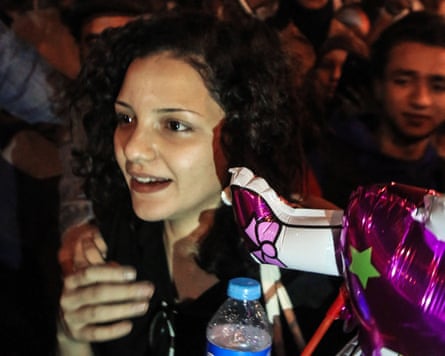
At a 2014 protest demanding her brother’s release, Seif was again arrested. Alongside 22 other human rights activists, she was convicted of breaching a law banning unauthorised demonstrations. A group of UN special rapporteurs called for their immediate release. This marked the start of three periods of political imprisonment. At this stage, her family’s status still offered some protection. “From my cell I could hear and see people being tortured,” Seif says. “Prisoners questioned, then cursed and beaten. I heard screams from electrocution, and did all I could to try and stop it.” Officers, frustrated they couldn’t physically harm Seif, found other ways to torment her. “They would purposely torture people where I could hear,” she says. “Officers would enter my cell with a woman prisoner and then beat her up in front of me. They did what they could within their means.”
She was transferred to Qanater prison, on the edge of Cairo. “It was dirty,” she says. “There was no privacy, including the toilets. You’re thrown in and forgotten about. Basics like medication and clothing have to be hard fought for.” This first period of imprisonment lasted 15 months.
Seif’s father died during that stretch. For 72 days, she was on hunger strike, only consuming water and rehydration sachets. “You become weak, but not hungry,” she says. “By day 60 I was fainting. While unconscious, I’d be put on drips, which I’d remove when I woke up.”
Seven months after her eventual release, Seif was rearrested. “I don’t even remember the stupid reason they gave for sending me to prison that time,” she says. (In fact, she was sentenced to six months for “insulting the judiciary”.) “In essence, it was to shut me up and scare me. They wanted me to stop making a fuss about Alaa.” At one stage, a quasi-government body offered to pay for Sanaa to study at the New York Film Academy. “But of course I didn’t take their money. I couldn’t leave Alaa locked away.”
Seif’s most recent arrest came in June 2020. It was the height of Covid. Not only had visits been stopped in Alaa’s prison, he wasn’t allowed to send letters to his family. “We had no idea if he was even alive,” Seif says. “So my mother, sister and I protested outside the prison. One night the police opened their barricades and women poured in to attack us. We were beaten with sticks and stones.” Seif was the violence’s primary focus. “My head was wounded; my body covered in bruises. When we went to the public prosecutor to put what happened on the record, I was arrested again, this time on terror charges.”
Seif was accused of spreading false news, misuse of social media and incitement to terrorist crimes (for which no evidence has ever been presented), then placed into pretrial detention. In March 2020, she was convicted of spreading false news, misusing social media and insulting a police officer. At the time, Amnesty International said the “Egyptian authorities arbitrarily arrested Seif and have now imprisoned her on bogus charges stemming purely from her peaceful criticism”.
During this third and final term of imprisonment, Seif concluded that leaving Egypt was her only option. “The cell I’d been in the first time housed seven of us,” she says. “This time, we were 82 women in the same space.” Now charged as a terrorist, her treatment also changed. “I was interrogated for hours, with only light clothes on while the AC was on its coldest setting. Neither I nor my lawyer knew what I was being accused of. I was told that whatever happened, nobody would hear or believe me.” To this day, Seif has never been presented with any evidence of her supposed offence. “I couldn’t comprehend how Alaa was experiencing this for so long,” she says.
Most of all, though, Seif had to accept that inside Egypt she was unable to help her brother. “It’s not only that the personal price was too high for me,” she says. “It’s that there was little point. A year and a half in prison over protesting about letters?
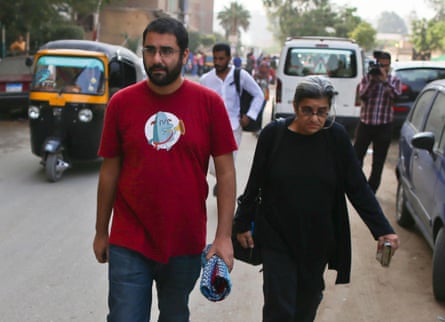
“My presence wasn’t even useful for my family,” she says. “My mum would get lost between the logistics of both of us being in prison. I had to go.” Seif’s mother was born in England, so the three siblings were able to acquire British passports. On completing her sentence, she was released last December. In March, she left for England.
Now the walls of her London kitchen are covered in lists of meetings and interviews that she must do, and people she needs to contact. She has just returned from Washington DC, where a third round of state department meetings yielded few tangible results.
With Egypt set to host Cop27 next month, Seif and her sister, Mona – also now based in the UK – have once again ramped up efforts for their brother, calling on the British government in particular to increase pressure to secure Alaa’s release. On Tuesday, Seif will start a sit-in at Whitehall outside the Foreign Office. “By sitting on their doorstep,” she says, “they won’t be able to shrug me off any longer. When the British government goes to Egypt next month for Cop, they must return with my brother.”
Under Boris Johnson’s premiership, the British government was engaging in diplomacy: the case was raised in Johnson’s final call with the Egyptian president. In her final days as foreign secretary, Liz Truss wrote to the family, calling the situation a “high priority” and affirming a commitment to securing Alaa’s release. Despite this, Seif is adamant more can be done. “There are precedents for prisoners with dual nationality being transferred to their other country,” she says. “It has happened with Americans, Australians and French political prisoners. But for it to work, the British state needs to push hard.”
A government spokesperson wouldn’t comment on whether plans were in place regarding Alaa’s case and Cop, instead saying: “The government is working hard to secure Alaa Abd El-Fattah’s release, and we continue to raise his case at the highest levels of the Egyptian government. The foreign secretary most recently raised his case when he met Egyptian foreign minister Shoukry at the UN general assembly last month.”
Adjusting to life in London over the past seven months hasn’t been easy for Seif. “It’s more comfortable than prison here, yes, but in some ways it feels like a continuation. It’s lonely. All I can focus on is my mission to secure my brother’s release. Only when he’s here with us can we start to try and make this country home.”










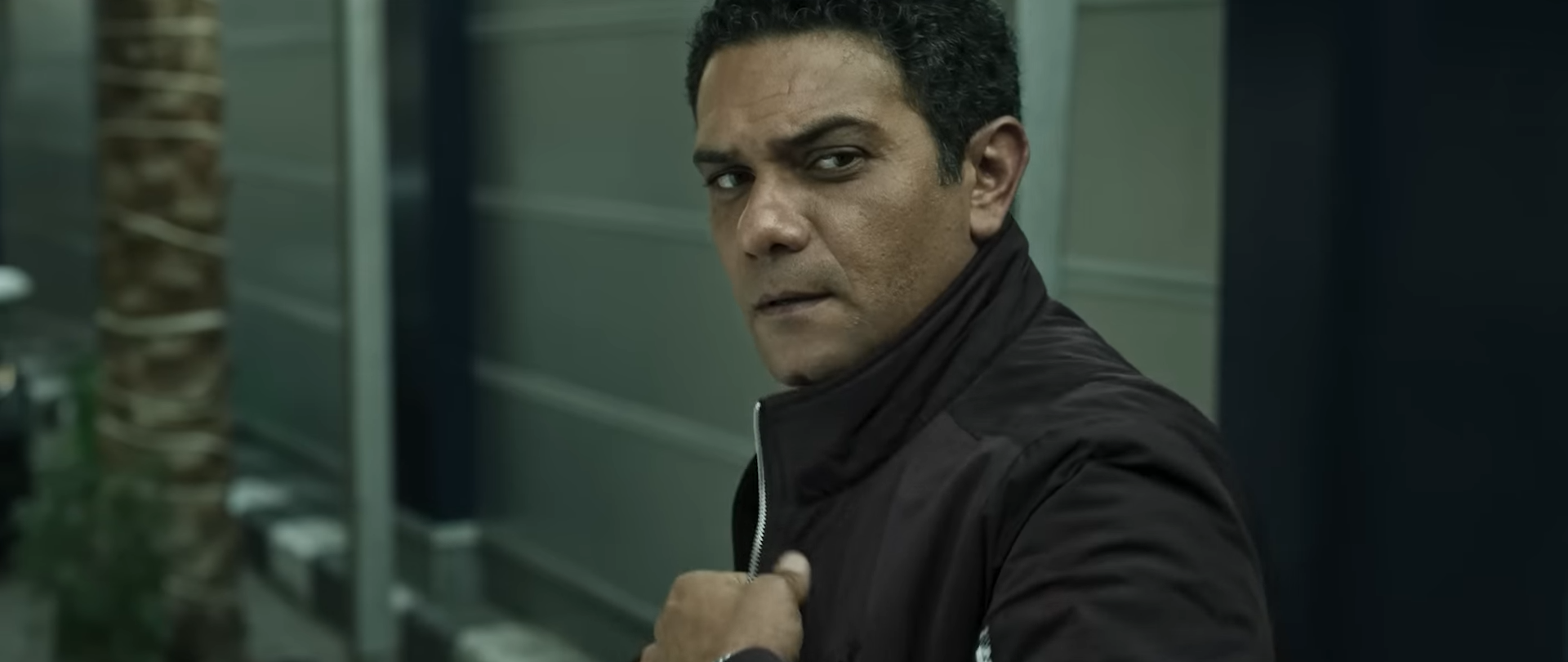




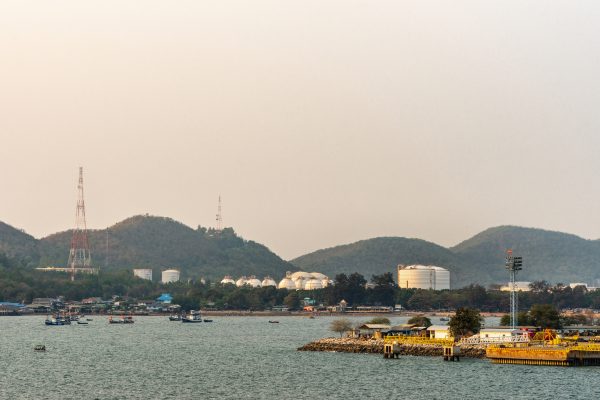


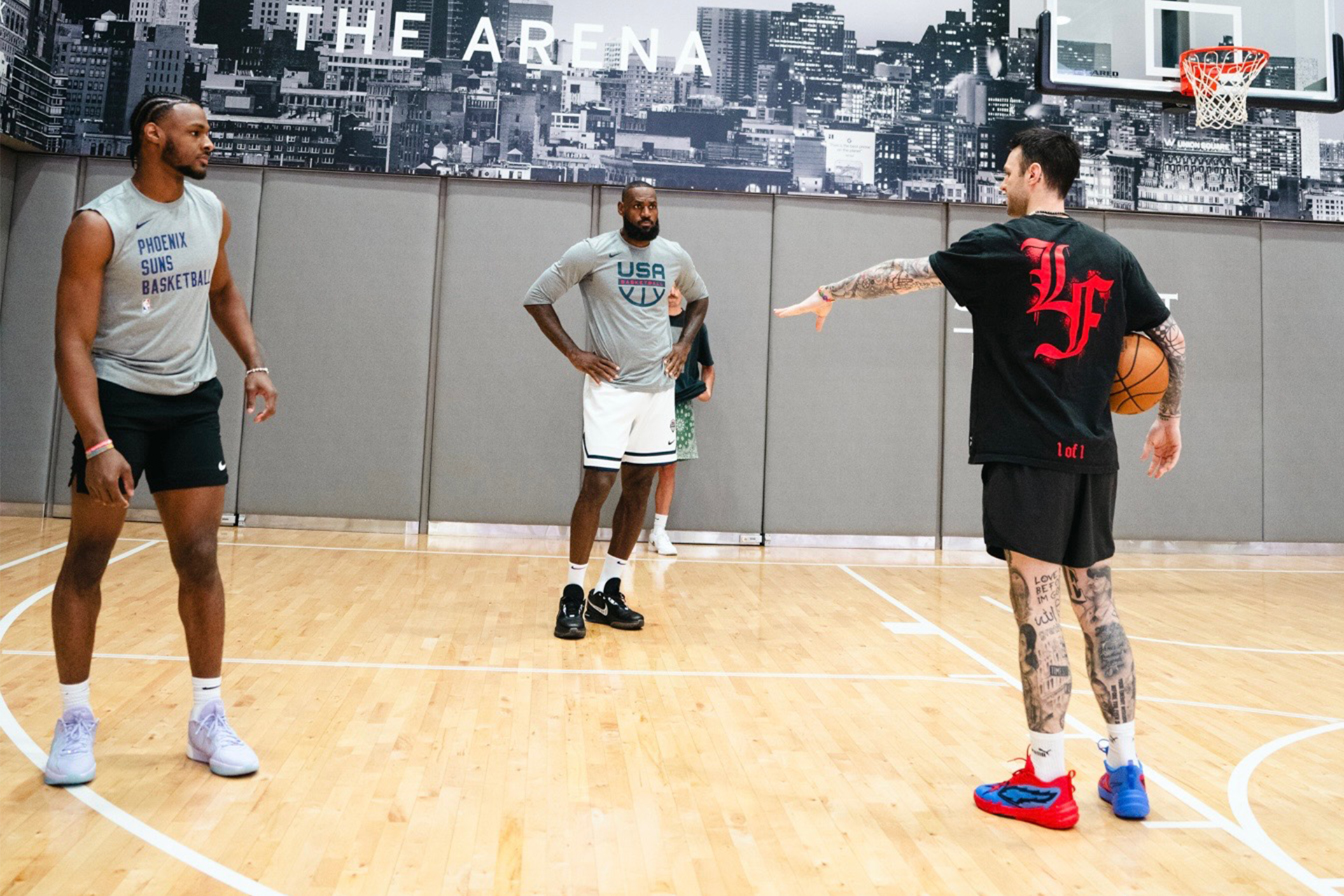

Discussion about this post